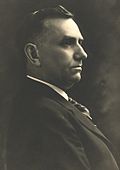Background
Roberts again sought the Democratic nomination for governor in hopes of succeeding Governor Rye, who was not running for re-election. His opponent for the nomination was former state legislator Austin Peay. Roberts gained the support of party bosses E. H. Crump, Hilary Howse, and Nashville Banner publisher E. B. Stahlman, [2] and defeated Peay in the primary by 12,000 votes. [3] In the general election, Roberts defeated Knoxville judge Hugh B. Lindsay, 98,628 (62.4%) votes to 59,518 (37.6%). Turnout is believed to have been influenced by that year's flu epidemic. [4] [5]
This page is based on this
Wikipedia article Text is available under the
CC BY-SA 4.0 license; additional terms may apply.
Images, videos and audio are available under their respective licenses.



